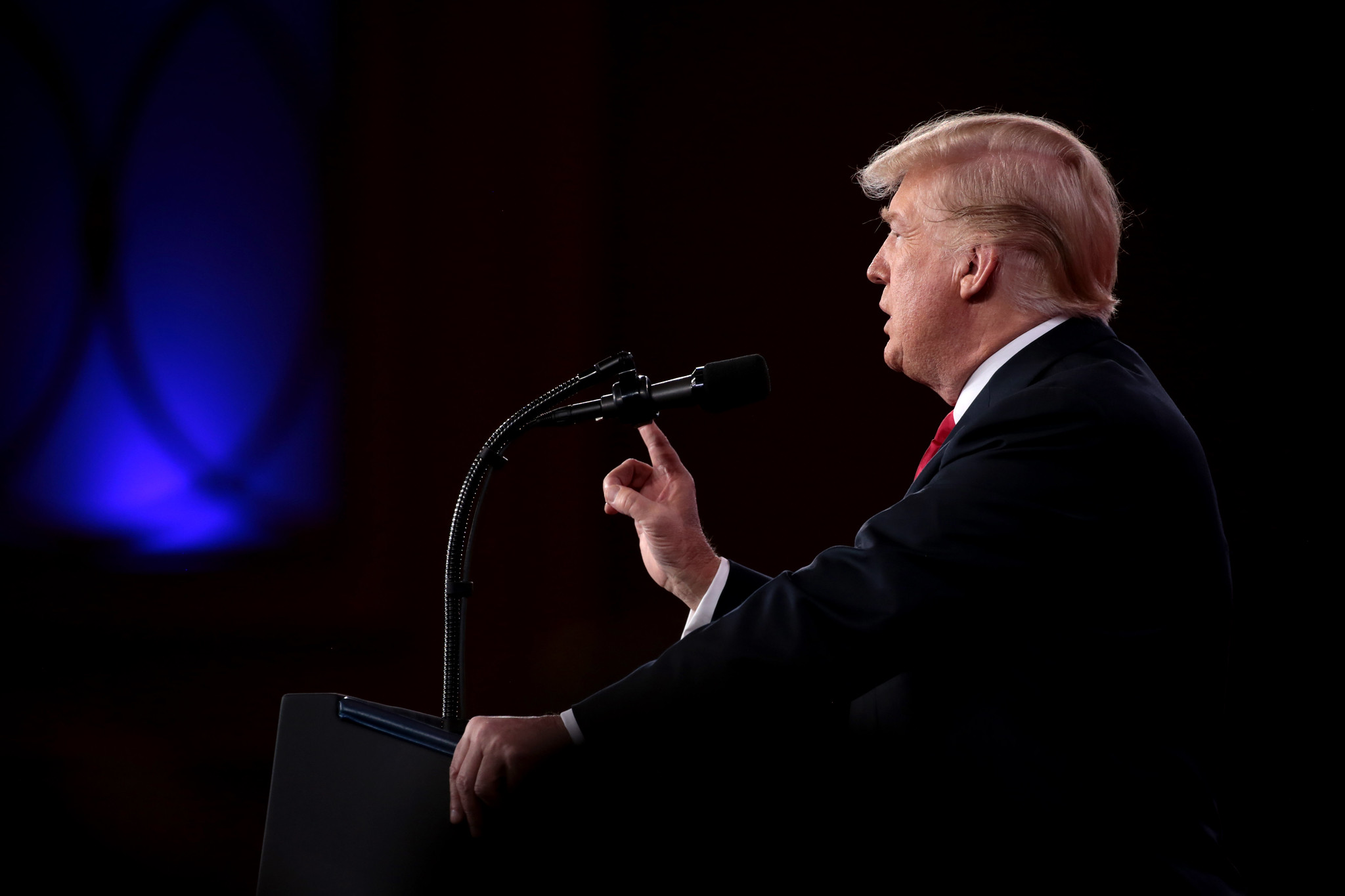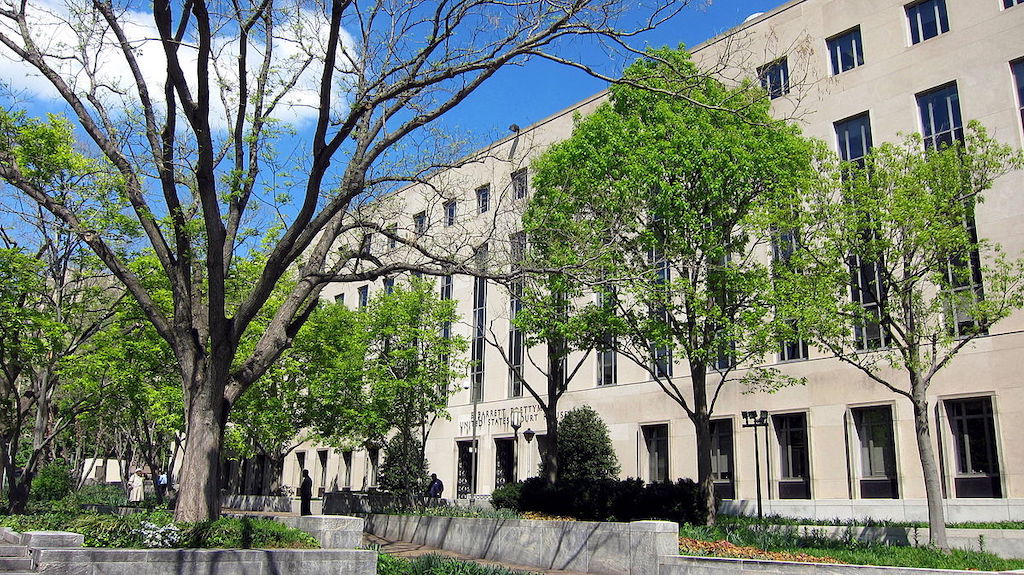The (Many) Trials of Donald J. Trump

Published by The Lawfare Institute
in Cooperation With

The former president is, to put it mildly, enmeshed in quite a few legal proceedings. They involve both criminal and civil cases, span a variety of alleged acts, and are brought in both federal and state courts. And at least parts of every one of them will happen at the same time.
There’s the New York civil fraud case against the Trump Organization, which goes to trial in New York state court this October. There’s the New York civil class action federal case claiming that Trump and his company promoted a pyramid scheme, scheduled for trial in January 2024. There’s the criminal case relating to alleged hush money payments to Stormy Daniels, also in New York state court, with a trial date set for late March 2024. There’s the E. Jean Carroll defamation case, scheduled for trial in January 2024, in federal court in New York. And of course there’s the Mar-a-Lago documents case in federal court in Florida, recently scheduled for trial in May 2024.
All that was the case even before Trump was indicted in connection with his role in the Jan. 6 attack on the U.S. Capitol; he was arraigned in Washington, D.C., on Aug. 3. A trial date has not yet been set (as is typical at this stage in any criminal proceeding).
Still another indictment is reportedly looming in Georgia, where Fulton County District Attorney Fani Willis has been investigating Trump’s alleged efforts to interfere in the election, including his infamous call importuning Secretary of State Brad Raffensperger to “find” 11,780 votes.
And all the while, Trump is running for president, a time-consuming undertaking even for candidates without any legal troubles. The Republican primaries begin in six months, just in time for the New York criminal trial, and the general election is only 15 months away.
All of which begs the question—how is this possibly going to work?
Which Case Goes First?
From a logistical standpoint, one key concern is which case should go first. More precisely, given that cases have already been filed in the order they have, which case should be pushed toward resolution the fastest?
Rhetorically speaking, it makes sense that the newest indictment in D.C. would be most important to resolve quickly. In advance of the 2024 election, surely it is more urgent for voters to know whether Trump will be proved guilty of conspiring against their rights—or defrauding the United States, or obstructing an official proceeding—than whether he mishandled classified documents, paid hush money to a porn star, or defamed a journalist after sexually assaulting her. Not to suggest that the latter three are unimportant, but they are less time-sensitive in light of the upcoming election.
There are other reasons to expect that the D.C. case would move fastest. The four statutes in the indictment are, legally speaking, relatively straightforward (with the possible exception of 18 U.S.C. § 1512(c)(2), which is being challenged by other Jan. 6 defendants in a petition for certiorari to the Supreme Court after a win for the government in the U.S. Court of Appeals for the D.C. Circuit). Only Trump is named as a defendant, notwithstanding the six unindicted co-conspirators; a single defendant eliminates some of the complexity, uncertainty, and delay that can attend prosecutions of multiple defendants. The judge assigned to the case has a record of efficiency in administering her caseload.
Most important, while the factual allegations evince an immense volume of evidence, there appears to be no classified information in the case, and there are thus no indications that discovery—the process through which the government provides its evidence to the defendant—will require special procedures like in the Florida case.
Nonetheless, the fact remains that all of the cases have been filed, and pretrial proceedings are already underway in all of them. Since this stage of litigation can feel like a bit of a black box, most people are focused on the cases’ respective trial dates. But a lot will happen long before we get to any of them.
Managing the civil cases in New York is the easy part. They are not likely to significantly complicate the criminal proceedings, except insofar as they further strain the parties’ resources and complicate scheduling (which ain’t nothing). Each of them involves facts—and thus evidence and witnesses—that are unrelated to the criminal charges. All three trials should be completed within the next few months, before the first criminal trials begin. And, critically, unlike in the criminal matters, Trump himself is under no obligation to be present at the proceedings. That may negate Trump’s likely argument that the criminal trial must be delayed because other civil cases or his presidential campaign will preclude him from participating. If he were interested in a speedy criminal trial, Trump could reasonably take the view that these cases are just money. He may have to pay out, but he doesn’t have to pay attention.
The criminal cases are another story.
Manhattan District Attorney Alvin Bragg brought charges first, despite widespread criticism. The case, scheduled for trial in March, alleges that Trump falsified business records to conceal a hush money payment he’d made to prevent a sex scandal from derailing his presidential campaign. It’s a novel application of the law, and experts have said that there’s no guarantee Bragg will succeed.
But the case will have a meaningful impact long before we know whether Bragg can actually secure a guilty verdict, much less one that will stand up on appeal. New York state law provides that Trump must be present at trial unless he moves to waive his presence, the government does not object, and the judge approves. There’s a good chance that Trump will repeatedly seek excusal on the grounds that he is running for president, but there’s no guarantee that he will get it. And he’ll definitely end up sitting in court some of the time.
Here’s just one small example of how this affects the other cases. For some time starting at the end of March and likely into April, Trump and his attorneys will be sitting in court for however many days it takes, instead of campaigning, and they will also simultaneously be preparing for a crucial moment in the Florida case—the deadline on April 25, 2024, for their response to the government’s Rule 6(c) motion, which will have been filed on April 11. That’s the motion in which the government proposes substitutions for classified information that will be disclosed to the jury.
This is a key stage of pretrial litigation, because it’s when Trump’s team can—and undoubtedly will—challenge the government’s arguments that the jury should not be allowed to see sensitive classified information. Preparing the response will almost certainly require Trump’s team to spend time in a secure facility (also called a sensitive compartmented information facility, or SCIF), reviewing the documents the government seeks to substitute in order to formulate their argument as to why the jury should see those documents. Assuming the lawyers get sign-off on the brief from Trump himself, which is arguably their ethical duty, he’ll probably need to come to the SCIF, too. When he’s not sitting in the courtroom in New York. Or at campaign events.
Meanwhile, we don’t yet know what will be going on in the D.C. case, as we don’t yet have a scheduling order. But it’s very likely that there will be some litigation deadlines during the month of April.
Needless to say, the parties’ interests diverge here. There’s no indication that any of the prosecutors would consider dropping their charges, nor that they’re inclined to seek lengthy continuances (which courts may deny anyway due to the Speedy Trial Act, even if Trump consents to a delay). Presumably they’ll seek to avoid at all costs the possibility of having to prosecute a president-elect.
By contrast, Trump’s team is pushing for delays in all of the cases.
How Will the Governments Manage Their Cases?
All of the prosecutors appear eager to move their cases forward expeditiously.
One wrinkle, of course, is that only the Mar-a-Lago and the Jan. 6 prosecutions can be reliably coordinated on the government side. That’s because they’re both brought by Special Counsel Jack Smith’s office, which means he can develop his strategy in each case with reference to the other. For instance, he could pursue expedited motions practice in the Jan. 6 case while leaving room in the Mar-a-Lago case to aggressively litigate pretrial issues—knowing that doing so may require pushing deadlines—rather than making compromises or dropping charges for the sake of efficiency. He could even agree to a defense effort to delay one case by way of deconflicting it with the other and letting that one proceed full steam ahead.
The trouble is that there’s no formal mechanism by which Smith and Bragg (and Letitia James, for that matter) can coordinate their cases. And, as my former colleague Brandon Fox explained recently on the Lawfare Podcast, it would be risky for them to do so informally because Trump would have a stronger argument that the cases are politically motivated if the Justice Department, which is part of the Biden administration, were consulting with elected Democratic prosecutors.
At the very least, that complicates things from a scheduling perspective. But it gets even more complex if Trump is indicted in Fulton County, where the subject matter overlaps significantly with the special counsel’s case in Washington. The cases will inevitably have evidence and witnesses in common because they both relate to Trump’s conduct on and around Jan. 6. That means not only that document productions could be delayed or witnesses could (often justifiably) be difficult to nail down but also that prosecutors’ tools will be curtailed. For example, prosecutors can often secure witness testimony by offering immunity to those witnesses who may have criminal exposure. But if prosecutors in both cases need the same witness, would those witnesses’ lawyers allow them to accept that offer if immunity were not on offer in the other proceeding as well? Alternatively, what happens if prosecutors in one case want to indict a key witness in the other case?
Additionally, prosecutors may have to be less confident in even the testimony they can get. Without prosecutors’ being present every time a witness talks, the Trump team will have more comprehensive knowledge of what they have to say than either set of prosecutors, which gives the former a competitive advantage for later cross-examination. Prosecutors will also have to be mindful of relying too heavily on witnesses because it’s generally risky to allow one person to testify multiple times. It’s human nature to be at least a tiny bit inconsistent when you recount the same story. Likewise, having witnesses in common means there will be multiple reports by both federal and state law enforcement and prosecutors. Trump’s team will justifiably leverage any of these inconsistencies to attack the evidence’s credibility.
All of these factors, on top of the scheduling difficulties, can’t help but affect the prosecutors’ strategies. In other words, the multiple cases are not just inconvenient; they will have a substantive impact on how these cases get prosecuted.
How Will Trump Use This for His Defense?
In every case against him, Trump will undoubtedly raise a great number of legal arguments with respect to the charges themselves—for instance, that the “prolific lies” the D.C. indictment alleges are protected by the First Amendment, or that Trump lacked the requisite mens rea because he was relying on the advice of his lawyers, or that the statutes don’t apply to his conduct at all.
Trump has already previewed several additional defense strategies, both in court and in the press. Unlike the arguments on the merits, these strategies exploit the unique challenges that arise as a result of concurrent proceedings. Foremost among them is to do everything possible to delay the proceedings. He formally requested that the Florida trial be scheduled for after the 2024 election. In D.C., he asked for an extension of time to respond to a perfectly routine government motion.
Trump is also attacking the special counsel as well as prosecutors in New York. He has attacked the presiding judges in the cases—with the conspicuous exception of Judge Aileen Cannon.
There’s no end of motions he could bring (and in some cases already has) to simply throw sand in the gears. Motions to recuse the judge. Motions to dismiss. Motions to change venue. Repeated motions to extend deadlines or permit Trump to be absent from the proceedings, including because of his obligations in other cases. Motions alleging “selective or vindictive” prosecution. Motions for continuances. Motions to suppress evidence. And on and on. Some, like a venue challenge, are very likely to be unsuccessful, but the point is that filing them can create delays and strain the prosecution’s resources. All of this is perfectly legitimate, as long as the arguments are not frivolous. But it will be time- and resource-consuming.
What About the Judges?
There’s more. The parties’ strategic maneuvering is important, but it’s far from dispositive as to how the cases proceed. Ultimately, that ball is in the judges’ courts.
Commentators are already speculating about how the two federal judges are likely to administer the special counsel matters. Cannon, who is presiding over the Florida case, is a relatively new judge. She is inexperienced with CIPA litigation and classified information generally, which will be a defining characteristic of that case. In fact, she has never presided over a lengthy jury trial. She is also perceived by many to have a pro-Trump inclination; her rulings in Trump’s earlier case challenging the government’s Mar-a-Lago search not only came out in his favor but were based on shoddy legal analysis that the U.S. Court of Appeals for the Eleventh Circuit quickly reversed. Her rulings thus far suggest that she’ll be sympathetic to Trump’s delay tactics.
Judge Tanya Chutkan is presiding over the D.C. case and has been on the bench only a few years longer than Cannon. But she has significant experience in criminal cases as both a lawyer and a judge, plus two years’ worth of Jan. 6-related cases. She’s already demonstrated that she is prepared to rule quickly and decisively, having denied Trump’s motion to extend a litigation deadline one day after it was filed (the same day the Special Counsel filed its opposition to that motion), and on a Saturday no less. Trump has already indicated he will try to have her recused, though his lawyer seems to have walked that back.
It’s unclear whether the judges presiding over the five Trump cases can or will communicate with each other about scheduling orders. The Code of Conduct for United States Judges, which is binding on federal judges, generally forbids them from engaging in conversations about pending matters before them outside the presence of counsel for both sides. Still, even if it is permissible to coordinate simply as to deadlines, doing so risks provoking complaints or even motions to recuse from Trump, which would just cause more delays.
There’s another area in which the judges’ administration of their cases may introduce difficulties: if any of them imposes pretrial conditions on Trump. It’s hard to imagine that Trump would end up with multiple ankle bracelets like when Paul Manafort was facing indictments in multiple jurisdictions. But they will likely impose other conditions along the lines of those we’ve already seen: restrictions on whom he can speak to, orders to avoid making public comments aimed at influencing a jury, rules preventing him from using evidence to attack witnesses. (Incidentally, the first two in the list were issued by magistrate judges.) Trump will probably resist all of them anyway, but he’ll have extra ammunition if he can claim any of the conditions compromises his defense in one of the other cases.
All of this is to say: Commentators are right that these cases will interfere with Trump’s political campaign. But that’s only one small part of it. The cases are going to interfere with each other, both with respect to scheduling and, more disconcertingly, in terms of how prosecutors strategize and present their cases. There’s no way around it.



